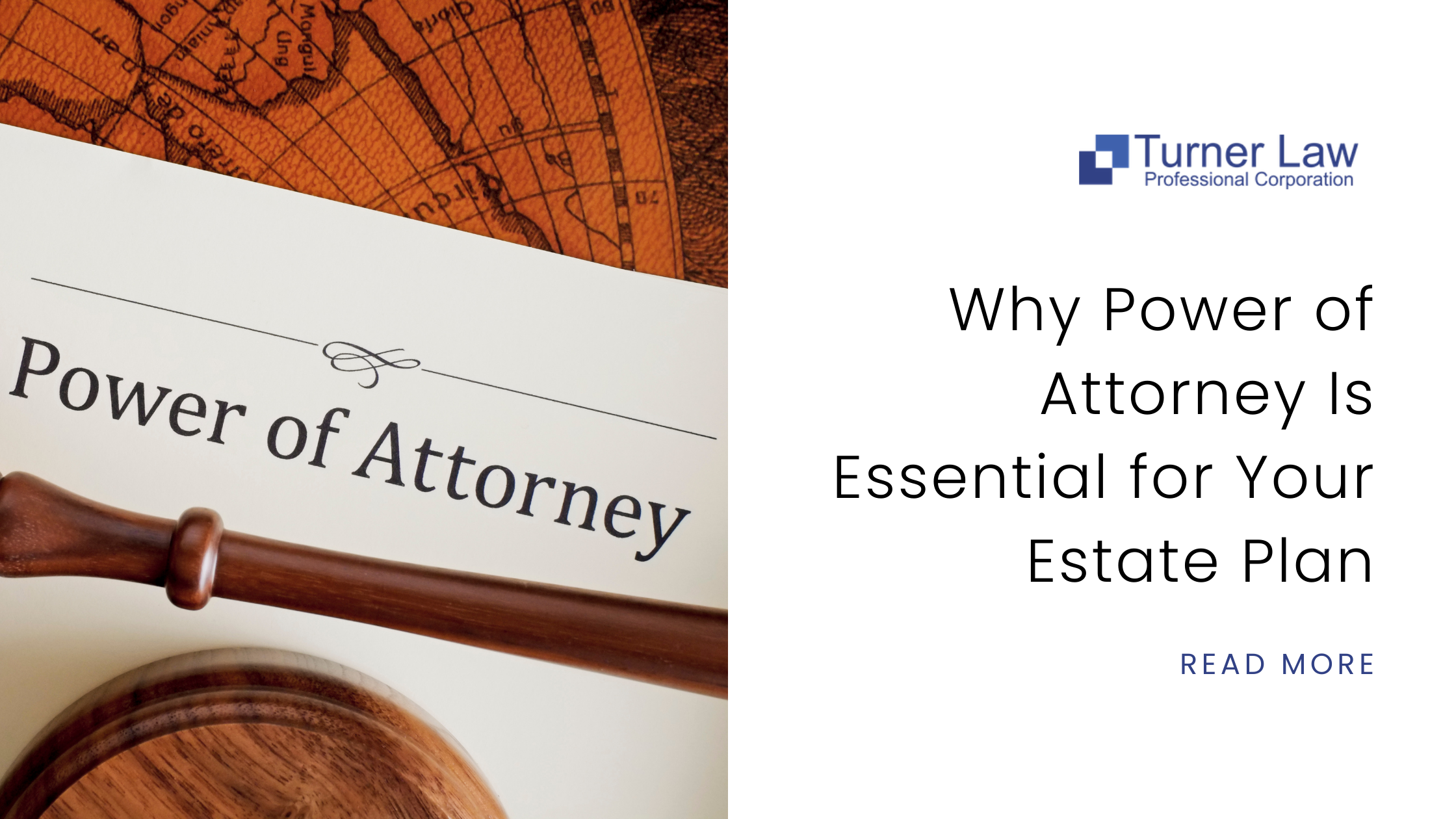Why Power of Attorney Is Essential for Your Estate Plan

- A power of attorney empowers a trusted individual to manage financial and healthcare decisions during incapacity, ensuring your wishes are followed without court intervention.
- A durable power of attorney provides seamless continuity for personal, financial, and business matters, safeguarding your family from unnecessary stress and conflict.
- Turner Law Professional Corp. offers guidance to create tailored, legally sound powers of attorney that integrate seamlessly with your broader estate planning strategy.
Estate planning is about more than distributing assets—it is about ensuring that personal, financial, and health-related decisions can be managed according to your wishes, even when you cannot act for yourself. One critical yet sometimes overlooked component of a robust estate plan is the power of attorney (POA).
A power of attorney is a legal document that authorizes someone else to act on your behalf. While wills and trusts often receive more attention, a POA offers unique and indispensable protection for periods of incapacity or absence. In this in-depth exploration, you will see why incorporating a well-considered POA into your estate plan is essential to preserve autonomy, protect family interests, and maintain continuity in both personal and financial affairs.
Understanding Power of Attorney
A power of attorney is a legal tool through which you grant another person, your “agent” or “attorney-in-fact,” the authority to make decisions and act on your behalf. There are several types of POAs, each serving specific purposes.
A general power of attorney confers broad authority, covering legal, financial, and business matters. It is often used when someone will be away or needs help managing affairs. A limited or special power of attorney restricts the agent’s authority to specific tasks or timeframes.
The most crucial variant for estate planning is the durable power of attorney. Unlike a general POA, which terminates if you become incapacitated, a durable POA remains effective during incapacity. This ensures your chosen representative can continue making vital decisions without the need for court intervention.
Medical or healthcare powers of attorney are also critical, empowering a trusted person to make healthcare decisions if you lose the capacity to do so yourself. This can include treatment choices, end-of-life care, and coordination with medical providers.
Avoiding Guardianship Proceedings
Without a durable power of attorney, if you become incapacitated, your family may have to seek court-appointed guardianship or conservatorship to manage your affairs. This process can be time-consuming, costly, and stressful.
Courts require extensive documentation, medical evidence, and hearings to determine incapacity and suitability of a guardian. In many cases, family members disagree on who should serve, leading to conflict that drains resources and delays urgent decisions.
By executing a durable power of attorney in advance, you avoid this scenario entirely. You proactively choose someone you trust, specify the scope of their authority, and reduce the risk of disputes. It is a safeguard that prioritizes your autonomy and relieves your family of unnecessary burdens.
Preserving Financial Continuity
Financial matters often cannot wait, even during medical emergencies or incapacity. Bills must be paid, investments managed, taxes filed, and property maintained. Without an authorized agent, accounts can become frozen, obligations can go unmet, and financial stability can unravel quickly.
A durable power of attorney ensures a seamless transition of authority, enabling your agent to act immediately if you are unable to manage affairs yourself. They can access accounts, pay expenses, oversee real estate, and manage investments to protect your estate’s value.
This continuity is vital for families with dependents, businesses, or complex assets. It prevents financial chaos at precisely the moment when stability is most needed.
Enabling Healthcare Advocacy
While living wills or advance directives address specific medical treatments or end-of-life preferences, they do not authorize someone to speak with healthcare providers or make decisions in unanticipated scenarios.
A healthcare power of attorney fills this gap by designating someone to make medical choices when you cannot communicate. This person can consult with doctors, review options, consent to or refuse treatment, and ensure your values and preferences guide care decisions.
Without a healthcare POA, providers may turn to default surrogates or require court orders. This can result in delays, unwanted treatment, or confusion about your wishes. A healthcare POA empowers your chosen advocate to speak clearly on your behalf, reducing uncertainty and protecting your dignity during vulnerable times.
Customization and Control
One of the greatest strengths of a power of attorney is its flexibility. You can tailor it to reflect your priorities, values, and level of trust in the agent.
You can choose whether the authority takes effect immediately or only upon incapacity (a “springing” POA). You can grant broad powers or narrowly define permitted actions. You can require your agent to provide regular accountings or limit their ability to make gifts.
This customization ensures your estate plan reflects your unique circumstances, rather than a one-size-fits-all approach. By clearly defining your agent’s role, you reduce the risk of misunderstandings, abuse, or litigation later on.
Planning for Business Interests
For business owners, a power of attorney is especially critical. Without one, incapacity can stall operations, disrupt contracts, and jeopardize the business’s survival.
A carefully drafted POA can empower a trusted colleague, partner, or family member to manage daily operations, sign contracts, access accounts, and make strategic decisions. This protects jobs, preserves business value, and supports the well-being of employees and customers alike.
A POA for business purposes can be distinct from your personal POA, with authority tailored to the business’s needs and governance structure. By including such provisions in your estate plan, you build resilience into your enterprise.

Reducing Family Conflict
Estate planning is as much about relationships as assets. When incapacity strikes without clear legal instructions, families can experience painful disagreements over who should step in, how finances should be managed, and what care the individual would have wanted.
A power of attorney reduces these tensions by naming a specific agent in advance. It demonstrates trust and clarity, signaling to family members that this is the person you have chosen to speak for you. While disputes can still arise, a valid POA offers strong legal authority that courts respect.
Moreover, discussing your choice with family members ahead of time fosters transparency. Loved ones understand your reasoning and can prepare to support your wishes, minimizing surprises and resentment later.
Preventing Exploitation and Abuse
Some fear that granting power of attorney invites financial abuse. This risk exists, but the alternative, being incapacitated with no plan, can be even more dangerous. Without a POA, courts may appoint someone you would not have chosen, or family members may scramble for control in ways that enable opportunism.
By choosing your agent carefully, limiting their powers as appropriate, and requiring regular reporting or oversight, you can mitigate abuse risks. Attorneys often recommend naming a backup agent, providing for successor authority if the first choice is unavailable or proves untrustworthy.
Proactive planning gives you the best opportunity to protect yourself. Rather than surrendering control, a thoughtfully drafted POA is an exercise in self-protection and empowerment.
Coordination with Other Estate Planning Tools
A power of attorney does not replace wills, trusts, or other estate planning documents; it complements them. While wills control asset distribution after death, POAs govern management of your affairs during life.
Trusts, especially revocable living trusts, can reduce probate and manage assets if you become incapacitated, but they often do not cover personal non-trust assets, healthcare decisions, or day-to-day matters.
A well-rounded estate plan integrates all these tools. The POA serves as a bridge, maintaining your financial and personal affairs during incapacity while your will or trust addresses what happens after death.
Failing to include a POA leaves a gap in this plan, exposing you to risks during your lifetime that no other document can fully address.
Legal Requirements and Best Practices
Creating a valid power of attorney involves following legal formalities. These requirements vary by jurisdiction but typically include written documentation, proper signatures, and sometimes notarization or witness requirements.
Working with a qualified estate planning attorney helps ensure your POA complies with local law and accurately reflects your wishes. An attorney can advise on key choices, such as selecting the right agent, defining powers, and coordinating with other estate documents.
Moreover, laws evolve over time. A POA drafted decades ago may no longer comply with current statutes or meet your changing needs. Periodic review of your estate plan, including your POA, is essential to keep it effective.
Overcoming Hesitation and Myths
Many people delay creating a power of attorney because they fear giving up control or believe they do not need it until they are older. These assumptions can be costly.
Incapacity can strike at any age through accident, illness, or unexpected medical events. Without a POA in place, loved ones may find themselves powerless to help when it is most needed.
Creating a POA is not about surrendering control; it is about defining it. By setting terms while you have full capacity, you ensure your wishes are respected. Your agent cannot overstep their authority without consequences, and you retain the ability to revoke or amend the document at any time while you remain competent.
Proactive planning is an act of responsibility toward yourself and your loved ones. It is about preparing for the unexpected while you have the opportunity to do so with care and intention.
The Role of Professional Guidance
While basic POA forms are widely available, generic solutions rarely reflect an individual’s full situation. Mistakes in drafting or execution can render a POA invalid or too vague to be useful.
An experienced estate planning attorney helps you navigate these challenges, ensuring the POA is legally sound, tailored to your goals, and integrated with your broader estate plan.
They can advise on complex issues, such as naming co-agents, managing real estate across jurisdictions, or protecting business interests. They can also help facilitate family discussions to build understanding and trust.
Professional guidance does more than produce a document—it helps you create a plan that works in real life, under real pressures, when your family needs it most.
Conclusion
A power of attorney is a cornerstone of personal and financial security. It ensures your affairs can be managed by someone you trust, avoids costly and stressful court interventions, and protects your autonomy during incapacity.
Whether you are managing personal finances, making healthcare choices, running a business, or supporting loved ones, a power of attorney provides the legal foundation for continuity and clarity. By recognizing its importance and taking steps to craft a thoughtful, legally sound document, you demonstrate care for your own future and compassion for those who may one day need to speak on your behalf.
Discuss your estate planning goals with our team at Turner Law Professional Corp. to create a strategy that supports your values and protects your interests. It equips those you trust with the legal authority to act when you need them most. Contact us today to learn more.

Add a Comment